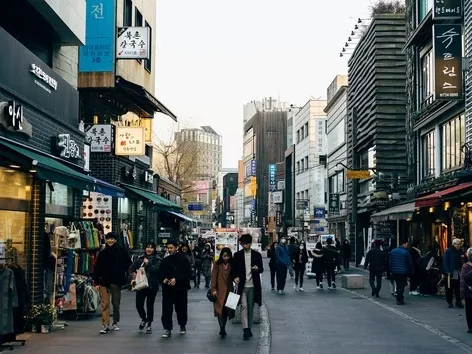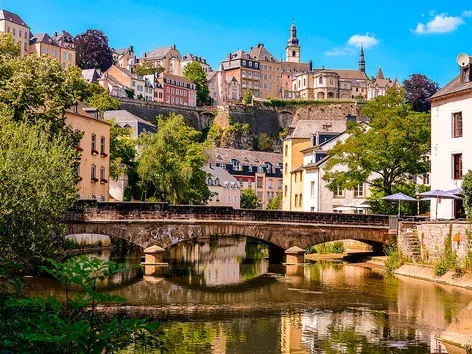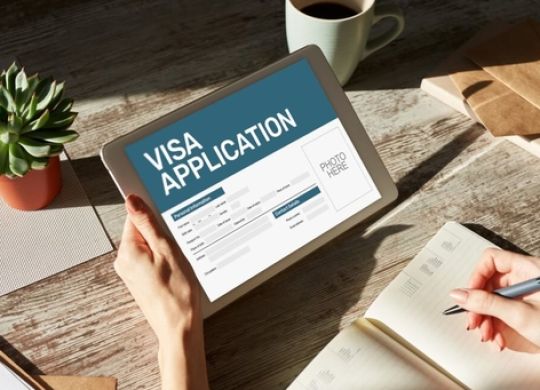Jobs for expats in South Korea: available types of work visas, the permit procedure and useful tips
Table of contents
- Types of work visas in South Korea
- Short-term work visas in South Korea
- List of documents for processing a work visa to South Korea
- How long does it take to process a South Korean visa application?
- What to do after arriving in Korea?
- What is the salary in South Korea?
- Interesting facts and useful tips for those planning to work in South Korea

Working in South Korea offers an exciting immersion in a dynamic mix of tradition and innovation. With its rich cultural heritage and fast-growing economy, the country offers a unique experience for both local and foreign professionals. Find out what types of work visas are available in the country and what the procedure for obtaining a permit is
With a combination of beautiful coastlines, lush mountains and cosmopolitan cities, South Korea is becoming an increasingly popular destination for expats. If you are one of those who are interested in employment in South Korea, this guide will give you detailed information about the job search procedure and help you understand the intricacies of local legislation.
Types of work visas in South Korea
The process of applying for a work visa to South Korea can seem quite complicated for an expat, because the country has many types of temporary visas, as well as 8 different categories of work permits. They differ depending on the planned activity.
The main types of permits for long-term work are the following:
- Professor visa E-1
This permit is for those who are lecturing or conducting research at a higher level (ie, college and university). It is valid for one year, but allows multiple entries. After the expiration of the term, the permit can be extended, in exceptional cases for a longer period.
- E-2 foreign language teacher visa
Permission for teachers of a foreign language (eg English) to work in a private company at a level above entry level (or entry level where the applicant must be an assistant). The visa allows multiple entries, is issued for two years and can be extended.
- Research visa E-3
Visa for researchers in the field of natural sciences or technology. It is valid for one year, allows multiple entries, and can be renewed every year (in some cases up to five years).
- Technological visa E-4
Available to specialists in the field of natural sciences and technologies, but can be extended not only to researchers. It allows multiple entry, there is a possibility of extension.
- Special occupation E-5
Certain professionals, such as lawyers, architects or software developers, can enter South Korea based on this permit. Applicants must meet licensing requirements both internationally and in South Korea. The visa allows multiple entry, is valid for one year and can be extended.
- Cultural and artistic visa E-6
The permit applies to those working in the entertainment, arts and sports industries. This is a one-year multiple-entry visa with the possibility of extension.
- E-7 special activity visa
The permit covers activities clearly defined by the Ministry of Justice. The visa is multiple-entry, valid from one to three years, with the possibility of annual renewal.
- D-5 long-term news coverage visa
Created specifically for journalists of foreign mass media. It is one-time, valid for three months and can be extended at intervals of one year.
- Non-professional visas
Issued to persons coming to South Korea to work in the following sectors: manufacturing (E-9-1), construction (E-9-2), agriculture (E-9-3), fishing (E-9-4) , service industry work (E-9-5), shore crew permits (E-10), and housekeeping assistants (F-1).
Short-term work visas in South Korea
In addition to long-term work visas in South Korea, there are a number of permits that are issued for a short period and can be used for work or business:
- Short-term visa C-3 (together with visa subtypes C-3-1 – general and C-3-4 – business)
The permit is issued by foreigners who are engaged in business activities, including market research, negotiations, consultations on concluding contracts. The permit is valid for 90 days, and the visa allows you to earn income.
- Short-term employment visa C-4
Applies to individuals who wish to stay 90 days or less in the country with the intention of earning income through short-term work, including advertising, lecturing, modeling, research, and contract services.
- Intra-corporate visa for a transferred person D-7
This visa is available to individuals who have worked at the head office, branch or local office of a foreign organization or company for at least 1 year and are to be transferred to South Korea. It is valid for a maximum of two years and is not available to D-8 visa holders.
- D-8 corporate visa (foreign investor)
Consists of four subcategories: the D-8-1 visa (investment in legal entities), the D-8-3 visa (investment in non-incorporated private enterprises), the D-8-2 visa (investment in commercial enterprises) and the D-8- visa 4 (launch of technologies and business). This visa is for foreign investors involved in technology businesses or businesses that require special skills. It is available for 2-5 years depending on the visa subtype.
List of documents for processing a work visa to South Korea
Of course, the package of documents will differ depending on the type of visa you are applying for, but there is a certain package of documents that is standard:
- Completed visa application form.
- Passport valid for at least 6 months after application and with a blank page for the visa stamp.
- Copy of passport.
- Passport photos taken within the last three months.
- Professional and educational certificates.
- Employment contract.
- Business registration license (in some visa applications)
- Tax declarations and financial payments of the company for the previous financial year.
- Letter of sponsorship from MNC or South Korean business/government/organization.
- Application fee (the cost of obtaining a permit is from USD 25 to USD 90).
In order to safely move, travel or work in a new country, you will need health insurance. You can issue an extended policy on our website using the link.
How long does it take to process a South Korean visa application?
Depending on the type of visa, the processing time for a South Korean work visa application can last from two weeks to two months. Therefore, expats are advised to start the application process early.
What to do after arriving in Korea?
Expats who plan to live in South Korea for more than six months must apply for a foreigner registration card.
Foreigners must apply for this card within 90 days of arriving in South Korea. After registration, the expat will receive a national identification document for foreigners, which gives them access to banking services, health insurance, the Internet, etc.
An application for a foreigner's registration card is considered within three to five weeks.
The procedure for moving to South Korea for permanent residence in 2024 in this article.
What is the salary in South Korea?
- The average salary in South Korea is 44,812,260 won ($38,000) per year. In Seoul, it is 65,431,200 won (US$55,500).
- The statutory minimum wage, established in 1988, recently increased by nearly 11% to 8,350 won (US$7) per hour. Working full-time at this rate, the workers would receive an annual minimum wage of 17,368,000 won ($14,700).
Interesting facts and useful tips for those planning to work in South Korea
- It is much easier for expats to find a job in South Korea than for citizens of the country, because many international companies work in the country.
- As of 2024, there are between 2,000,000 and 2,500,000 expats living in South Korea.
- Most foreigners work in South Korea in one of the following industries: media and entertainment, education, tourism, science and technology, and intergovernmental organizations.
- Most foreigners find work on the Internet, the most popular portals are: Job Korea, Saramin, Worknet, Seoul Global Center and Incruit.
- South Korea has a specific resume style that expats should follow when applying for a job in the peninsula country. It is recommended that you download the standard South Korean resume template and fill it with the relevant information.
- A cover letter in South Korea is also called a “self-introduction” letter (jagiseogaeseo /자기소개서). As with any cover letter, Korean recruiters will want to know more specific details about your work history and qualifications that make you an ideal candidate for the position you are applying for.
- When going to an interview in Korea, you should arrive 10-15 minutes earlier. Bring copies of your resume and cover letter, if possible, in English and Korean.
- In Korea, it is traditional to bow instead of shaking hands when meeting someone. Don't try to shake the interviewer's hand unless he starts to shake his hand.
South Korea welcomes expats and offers foreigners excellent job opportunities, decent wages and a developed social sphere, so be sure to pay attention to this country if you are considering moving abroad.
We will remind you! The government of the Republic of Korea plans to introduce a new visa for foreign nationals who dream of exploring Korean culture. The main goal of such an innovation is to return tourist flows to the previous level. Learn more about the features of the new visa in South Korea in this article.
Ihor Usyk - head of Visit World's legal department
To arrange a safe move to South Korea, I advise you to contact a specialist. My colleagues, qualified specialists with legal education, will help you avoid unpleasant situations when traveling abroad.
Products from Visit World for a comfortable trip:
Checklist for obtaining a visa and necessary documents in South Korea;
Legal advice on immigration to South Korea;
Travel insurance for foreigners in South Korea;
Medical insurance all over the world.
We monitor the accuracy and relevance of our information. Therefore, if you see any error or discrepancy, please write to our hotline.
Recommended articles
2 min
Residence permit
Moving to Japan in 2025: How to get a residence permit in Japan?
Japan is one of the most attractive countries to live and work in, but its migration system is quite complicated. Foreigners planning to move in 2025 need to follow a clear algorithm. Learn more about possible immigration paths, visa requirements, rules for legalization upon arrival, and employment opportunities
07 Jun. 2025
More details2 min
Employment
How to find a job in Luxembourg: a detailed guide for expats with changes for 2025
Luxembourg is a country of opportunity, attracting the best global talent with its thriving economy and career prospects. The local job market is unique – international and multilingual, requiring in-depth knowledge of languages, regardless of sector or profession. Luxembourg will continue to attract foreign workers in 2025. Learn more about working in Luxembourg in 2025 for foreigners, the most popular vacancies and get useful tips for finding a job
19 Dec. 2024
More details1 min
Work
Kazakhstan hires foreign workers within the established quotas. Find out how many specialists will be able to find employment in the country in 2025 and when to apply
07 Aug. 2024
More details2 min
Employment
TOP-20 most in-demand professions in Ireland for foreigners in 2024: current list
Ireland is currently experiencing an acute shortage of personnel in 20 professions in healthcare, IT, engineering, manufacturing, and construction. Find out more about which professions will be the easiest to obtain a work visa in Ireland in 2024
08 Aug. 2024
More detailsAll materials and articles are owned by VisitWorld.Today and are protected by international intellectual property regulations. When using materials, approval from VisitWorld.Today is required.
